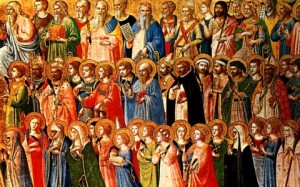All Saints — A Call to Holiness for All
by Marcellino D'Ambrosio, Ph.D. | November 1, 2013 12:01 am
 [1]
[1]“All Saints” by Fra Angelico
At age 16, I thought that aspiring to holiness was out of the question. If you really wanted to be holy, I thought, you had to be a priest, nun, or brother. And you had to spend your days doing “religious stuff” like praying, preaching, teaching catechism, or serving the poor. But I had developed an interest in the opposite sex and was headed toward a career in music. So I was disqualified. The best I could hope for was to avoid breaking the 10 commandments, get to confession when I failed, not miss Mass on Sunday and toss a few bucks in the collection each week. That way, I could at least make it to heaven after a hopefully brief stay in Purgatory. But true sanctity, that was out of my reach.
If holiness were about marital status or what you do for a living, I would have been right. But the Second Vatican Council made very clear that my assumptions were wrong. Holiness is not about what you do but with how much love you do it. Holiness is really the perfection of faith, hope, and sharing in God’s very nature, which is love (I John 4:8). We are talking about a special kind of love here, the love that gives freely of itself to another, that even lays down its own priorities, interests, and very life, for another.
So is holiness difficult to attain? No. It is impossible. At least on our own steam. But that’s the thrill of it all. God invites us into an intimate relationship with Him through Jesus. He takes up residence within us and makes it possible to love with His love. Grace is the love of God that comes into our hearts as a free, undeserved gift and enables us to be like God.
So that means spending all our time in chapel? No it means doing daily, ordinary things with extraordinary love. The Virgin Mary, our greatest example of holiness, was a housewife and a mother. Jesus and his foster father, St. Joseph, apparently spend most of their lives doing manual labor. But when Mary did the wash, she did it for love. When Joseph made a table, he did it for love. When hardship and danger threatened, they met it with faith, hope, and love.
So holiness is for every baptized person, regardless of personality type, career, age, race, or marital status. In baptism, we are all reborn with the spiritual muscles necessary to get us across the finish line. Yet these muscles must be nourished and exercised if they are ever to develop and carry us the full distance. God provides the necessary nourishment in the Word of God and the Eucharist. And he sends us ample opportunities to exercise.
But there’s the rub — many of us don’t want to exert ourselves. It can be uncomfortable. We stretch a bit to finish school, to excel at sports, to win the heart of the love of our lives. But when it comes to the things of the Spirit, we often settle with being couch potatoes.
Leon Bloy, a French Catholic writer, once said “the only tragedy in life is not to become a saint.” Holiness is about realizing our deepest, greatest potential, becoming who we were truly destined to be. What a shame it would be to miss it.
Dr. Marcellino D’Ambrosio writes from Texas. For his resources on parenting and family life or information on his pilgrimages to Rome and the Holy Land, visit www.crossroadsinitiative.com [2]or call 1.800.803.0118. This was originally published in Catholic News Service’s syndicated column, Faith Alive as a reflection on the Solemnity of All Saints on November 1.
If you liked this reflection on the Solemnity of All Saints, please share it with your friends and family using the Share and Recommend buttons below and via email. We value your comments and encourage you to leave your thoughts below. Thank you! – The Editors
- [Image]: http://www.integratedcatholiclife.org/wp-content/uploads/all-saints-fra-angelico-featured-w480x300.jpg
- www.crossroadsinitiative.com : http://www.dritaly.com/
Source URL: https://integratedcatholiclife.org/2013/11/dambrosio-all-saints-call-to-holiness/